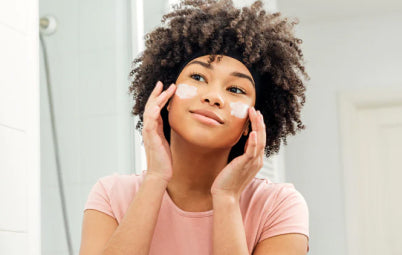Knowing what you can and can't use when pregnant or breastfeeding can be a bit of a minefield. Mystery ingredients in skincare can feel daunting, as you want the best for your baby. However, there are alternatives out there that are safe for you and your little one during this special time.
If you’re on the hunt for pregnancy-safe skincare information, you’re in the right place. We’re breaking everything down so you know what ingredients you can and can’t use, what products have a stamp of approval, and why it’s important. Whether you want general recommendations or answers to specific questions (such as what is a good pregnancy-safe face wash, and whether or not you can use hyaluronic acid while pregnant) you’ll find something here for you – all with the medical seal of approval from Face Dr founder Dr Julia Langford.
We’ll also cover the Obagi range and why our Skin Experts always recommend specific products in this range when advising on skincare for pregnant women. Let’s dive in…
Want personalised recommendations on which products are suitable during pregnancy (and will actually help your skin)? Book a consultation with your Face Dr Skin Expert here:
Here’s what we’ll cover in this article:
- How does your skin change during pregnancy?
- Why are some products not suitable for use during pregnancy?
- What ingredients are not recommended during pregnancy?
- What ingredients are safe to use while pregnant?
- What products in Face Dr’s range are not suitable for use during pregnancy?
- What products in Face Dr’s range are suitable for use during pregnancy?
- What is the Obagi range?
- What Obagi products are recommended for use during pregnancy?
- Summary: Should I use skincare products while pregnant?

How does your skin change during pregnancy?
During pregnancy, you will experience hormonal changes and, since our hormones tend to affect our skin, you may see skin changes you haven’t noticed before, like patches of hyperpigmentation or acne. If your skin changes a lot during pregnancy, then skincare may be important in order to maintain a great complexion throughout.
Why are some products not suitable for use during pregnancy?
When we apply skincare products, they absorb into the skin, and the ingredients within them are chosen to have specific effects on the look and feel of our skin. According to the Centers for Disease Control and Prevention, chemicals that are absorbed through the skin can make their way into the body. In everyday life, this means the products we put on our skin can help to alleviate many skin concerns. However, for women who are pregnant, we must consider that some absorbed ingredients could reach the unborn baby. Ingredients with a high systemic absorption rate are not advised for pregnant women, while ingredients that act locally are considered safe to use.
There is limited evidence-based data on the safety of ingredients and products during pregnancy, as clinical trials on pregnant women are extremely rare. This is because, understandably, no one wants to roll the dice on whether or not something is pregnancy-safe. However, animal, anecdotal and case-specific studies have allowed scientists to discover the ingredients and products that could cause side effects during pregnancy. With the right information, you can find the products that are safe to use without compromising on your skincare for 9 months.

What ingredients are not recommended during pregnancy?
There are a few ingredients and products that experts would advise against during pregnancy. It is universally accepted that, while pregnant, you should avoid using products that contain:
Hydroquinone
It is estimated that 35% – 45.3% of hydroquinone is absorbed through our skin when applied, and although one study found no adverse effects, there isn’t enough evidence to say for sure. Due to the substantial absorption rate when compared with other products, it is recommended that you avoid using it for the duration of your pregnancy.
Tretinoin or Retinol
Complications have been reported as a result of topical retinoids such as tretinoin, and although the studies did not involve a large enough sample of pregnant women to make definitive conclusions, retinoids remain controversial as an ingredient if you are expecting and should be avoided. It is known that oral tretinoin leads to foetal malformations and developmental abnormalities.
Salicylic Acid
A number of studies have been done on salicylic acid and no increase in the baseline risk of adverse events has been found, although the studies did not look at topical use. As there are no topical studies or examples to conclude whether or not salicylic acid is safe to use during pregnancy, we recommend avoiding this while pregnant.
If you are worried about which ingredients and products are suitable for use during pregnancy, you can speak to a Skin Expert for free.
What ingredients are safe to use while pregnant?
The below skincare ingredients are generally considered safe to use while pregnant:
- Vitamin C: Vitamin C is used in many skincare products, and is considered safe for most skin types, as well as being safe for use during pregnancy. It is known to brighten skin, and can also reduce redness, hyperpigmentation and promote collagen production, among other skin benefits.
- Fruit Acids: Ingredients such as Glycolic Acid and Lactic Acid (both types of alpha hydroxy acids) are thought to be safe. It’s worth knowing that several animal studies found high doses of Glycolic Acid could have adverse effects during pregnancy, but no human studies have been done. However, topical glycolic acid is thought to be safe during pregnancy as only a very small amount is absorbed by the skin.
- Hyaluronic Acid: Hyaluronic Acid is thought to be safe for use during pregnancy, although choosing a type with a low molecular density is encouraged.
Sunscreens: Sunscreens are thought to be safe for use during pregnancy as they have a very low absorption rate of 8.7% when applied to skin. Although there have not been many studies on this product, sunscreens have been used to treat or prevent melasma in pregnant women, with no adverse effects reported.

What products in Face Dr’s range are NOT suitable for use during pregnancy?
At Face Dr, we stock a range of trusted brands that provide consistently brilliant results for our clients. However, if you are pregnant we will recommend accordingly. Although ZO Skin Health is one of our best-selling and most effective brands, they are not licensed for use during pregnancy or while breastfeeding, and they have not been tested on pregnant women, so we will always advise alternative products.
If you have any concerns or questions about your skincare choices during pregnancy, you can book an online consultation with a Skin Expert for personalised advice.

What products in Face Dr’s range are suitable for use during pregnancy?
We often recommend the Obagi range due to its science-backed formulations and the success many of our clients have seen from using the products. Plus a number of the products are suitable for use during pregnancy and breastfeeding, which means you don’t have to compromise on the health of your skin.
What is the Obagi range?
Obagi is a skincare brand that provides award-winning products on a prescriptive and non-prescriptive basis. Their range is made up of many products designed for a range of skin types and concerns, including reducing the early signs of skin ageing (like fine lines and wrinkles), minimising the appearance of dark spots, addressing hyperpigmentation, tackling acne, protecting against the sun, minimising greasy, oily or dry skin, and more.
At Face Dr, we always offer personalised recommendations based on the skin issues you are facing, but when a client is pregnant, we often recommend certain products within the Obagi range as they offer safe ingredients in highly effective formulations.

What Obagi products are recommended for use during pregnancy?
Products in the Obagi range that are suitable for use during pregnancy and breastfeeding include:
In the morning
- Nearly any Obagi cleanser product). One of our favourites to recommend is the Nu-Derm® Gentle Cleanser as it is mild on sensitive skin that may be suffering more than usual due to pregnancy hormones.
- Obagi’s Professional-C® Serum range is a great, pregnancy-safe way to introduce vitamin C to your skin for a boost of antioxidants. It is available with 10% and 15% vitamin C, both of which are safe.
- Obagi’s Professional-C® Peptide Complex is safe to use while you’re expecting, and can deliver skin-brightening antioxidants (including vitamins C and E), defend against free radicals, improve skin firmness and fine lines, and more.
- Obagi Nu-Derm® Exfoderm® and Nu-Derm® Exfoderm® Forte are great pregnancy-approved products to exfoliate and remove dull skin while revealing a brighter, more radiant complexion. Learn more about them here: Exfoderm® vs. Exfoderm® Forte: What's the difference?
- ELASTIderm Eye Cream or ELASTIderm Eye Gel are the perfect pregnancy-safe eye products. Both are formulated with Bi-Mineral Contour Complex which is clinically-proven to reduce the appearance of eye area fine lines and wrinkles, so they are a brilliant addition to your skincare roster while pregnant.
- For a regular hydrator, Obagi Hydrate® Facial Moisturizer, Hydrate Luxe® and Daily Hydro-Drops® Facial Serum are all great options that are pregnancy-approved. It’s common for pregnant women to have dry skin during pregnancy, so this is a step you won’t want to miss.
- Obagi Sun Shield™ Matte Broad Spectrum SPF 50 is our recommended sunscreen product for anyone looking to keep skin protected in the sun while pregnant.
In the afternoon
- Any Obagi cleanser product (one exception, please ask your Skin Expert).
- Obagi’s Professional-C® Peptide Complex
- ELASTIderm Eye Cream or ELASTIderm Eye Gel
- Obagi Hydrate® Facial Moisturizer, Hydrate Luxe® or Daily Hydro-Drops® Facial Serum
- Obagi’s Professional-C® Peptide Complex

Summary: Should I use skincare products while pregnant?
You can absolutely use active and effective skincare products while pregnant; it simply takes a little more planning beforehand. If you are worried, we recommend you:
- Check each bottle carefully to see if any of the ingredients are on the ‘do not use’ list.
- If it makes you feel better, Google any ingredients you are not familiar with to make sure none are unsuitable.
- Book a free consultation with one of our Skin Experts to discuss your skin needs, what ingredients/products are best for you, and which of those are pregnancy-approved. If you are at all worried, our Skin Experts can help recommend the Obagi Medical products that would best suit you.
Ready to speak to a Skin Expert about pregnancy-safe skincare?










